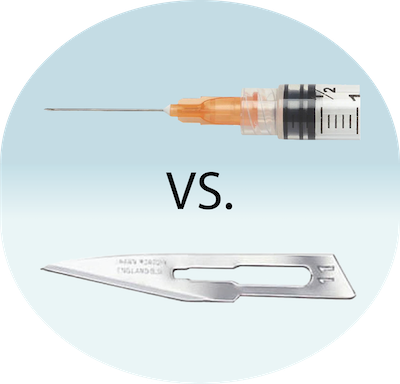
Orthopedic surgery presents hope – and risks. There are alternatives that should be considered.
Many patients with joint pain have the mistaken notion that a major orthopedic surgical procedure is a cure-all. I devoted 37 years to adult reconstructive orthopedic surgery performing both total joint replacement and other invasive procedures to help diminish the symptoms and improve the function of those afflicted with osteoarthritis of a major joint. Then I moved to regenerative-medicine-based healing, using a needle in lieu of a knife.
My Journey to Regenerative Medicine
Regenerative medicine uses either your body’s processed blood, bone marrow, or fat to combat the inflammation associated with skeletomuscular disease, whether post traumatic or degenerative. My mission was to postpone or perhaps avoid a major surgical musculoskeletal procedure. While practicing orthopedic surgery and then regenerative medicine, I documented the outcomes of my various procedures. This allowed me to pioneer the notion of an evidence-based practice. The patient’s benefit was knowing that I depended on science and not anecdote to dictate the best treatment alternative. The benefit first to orthopedic surgery and later to regenerative medicine was and continues to be my contribution to providing guidance for the best possible treatment methods. I continue to contribute to regenerative medical education through my recent published and accepted scientific publications and worldwide presentations.
Initial Outcomes – The Needle vs. the Knife
I digress; the purpose of this post is to educate you the reader and strike a word of warning. The enemy of good is better. Outcome data for both a major orthopedic surgical procedure and a contemporary biologic application for grade 2 or 3 osteoarthritis of a major joint are not dissimilar when measuring patient satisfaction, symptom reduction and functional improvement. What we can’t provide is how long the regenerative medicine benefits will last; it is too soon to know.
The Great Divergence – A Failed Knife vs. a Failed Needle
What we do know is that the option available for a failed major orthopedic procedure is frequently not satisfactory. A revision surgery can be both painful and unsuccessful. On the other hand, the fallback position for an orthobiologic procedure is a repeat with a better chance of success the second time.
Microfragmented Adipose Tissue as an Effective Knife Alternative
In the evolving world of biologics Microfragmented Adipose (fat) Tissue (MFAT) is gaining traction in the US and worldwide. Readily obtained by a miniliposuction in an office setting, the adipose tissue processed with Jointechlabs’ MiniTC processing system offers a symptom-relieving, function-improving alternative with a needle and not a knife, for those afflicted with grades 2 and 3 osteoarthritis. No bridges are burned and there is a chance you will never need a major orthopedic surgical procedure.
Next Steps For Patients and Doctors
If you’re a patient, do a search on “orthobiologic pain microfat” (https://www.google.com/search?q=orthobiologic+pain+microfat) or see the Jointechlabs website at https://jointechlabs.com/consumers. If you’re a doctor or medical professional, find out more about MFAT, MiniTC and its advantages for your patients, your practice, and yourself, including testimonials from both doctors and patients, at https://jointechlabs.com.
Editor’s note: Dr. Mitchell Sheinkop is a practicing orthopedic physician with over 30 year’s experience and is Jointechlabs’ Medical Director.